
Afghan presidential candidate Abdullah Abdullah speaks to supporters at a meeting in Kabul, the day after officials released preliminary election results. He told the crowd he would sacrifice himself before accepting fraudulent results. (Josh Smith/Stars and Stripes)
KABUL, Afghanistan — Afghan presidential candidate Abdullah Abdullah pulled his support from the country’s United Nations-led election review Wednesday, arguing it was incapable of identifying the widespread fraud he believes took place.
His rival, Ashraf Ghani, removed his observers from the audit later in the day at the request of the U.N. assistance mission in the interest of fairness. There was a brief halt to the election audit, which resumed in the afternoon. A representative for the U.N. has said the audit will continue without both sides, if necessary.
The review is already behind schedule because of frequent disputes between the two candidates and previous boycotts from Abdullah’s side.
A prolonged boycott by Abdullah would call into question the legitimacy of any audit results, possibly leading to further uncertainty and unrest in the country. Afghanistan is already struggling with an entrenched insurgency and moribund economy, and it is running out of time to sign key agreements with NATO for a post-2014 military presence.
At issue this time is a phase of the audit that began Monday, an “invalidation” process that formally separates good votes from those deemed fraudulent. An Abdullah campaign spokesman said the criteria adopted by the U.N. for the new phase was too weak to identify the massive numbers of fraudulent votes the candidate believes exist.
Abdullah’s decision is a blow to U.S. efforts to resolve the election through an impartial audit and to elicit agreement from both candidates to form a unity government including both the winner and the loser.
“The truth is that we have won in two rounds of the election,” Abdullah spokesman Mujeeb-ur-Rahman Rahimi said. “And there are elements in this country that are not ready to accept democratic rule.”
The original results from the June 14 runoff have Ghani ahead by more than a million votes. Abdullah received the most votes in the election in April.
The candidates had agreed to accept audit results under a deal brokered by Secretary of State John Kerry in July and pressed again earlier this month. Yet Abdullah’s campaign has complained that audit rules have been too lax to catch what it holds is a massive scale of fraud involving millions of votes.
On Tuesday, an Abdullah campaign member demanded that the U.N. add three criteria to the invalidation process that had already been ruled out by the organization. The campaign threatened to boycott the audit if the steps weren’t accepted.
Rahimi on Wednesday accused the Afghan organization conducting the audit, the Independent Election Commission, of rigging the process. He said ballot boxes from some provinces had been stuffed by officials after the boxes arrived in Kabul, and he claimed that some tally sheets of audited boxes were forged. He said such ballots wouldn’t be invalidated under the U.N. rules.
“If the U.N. in its audit process doesn’t apply high standards, then what it does in this process is legitimize fraud instead of target it,” he said. “And that is what we’re not ready for.”
The campaign also seized upon a New York Times report last week citing unnamed Western analysts who said they believed Ghani had committed enough fraud to win the election. Those officials said that the fraud had been directed by a coterie of presidential aides and ministers and managed in each province by government, election and security officials.
Rahimi said the only solution to the crisis was for the U.N. to accept the new criteria for the invalidation process.
A member of the Ghani campaign said it expects the U.N. to keep the criteria unchanged, despite Abdullah’s protests.
“We will keep a close eye on the audit process,” Ghani campaign member Dawood Sultanzoi said. “If the U.N. or international observers take any steps outside the national interest of the Afghanistan people, then they will have to answer to us.”
During a news conference Wednesday, U.N. representative Nicholas Haysom defended the process, noting that both campaigns agreed to the audit’s rules and limits. He urged the two sides to return to the audit process.
Abdullah met Wednesday with Daniel Feldman, the U.S. special envoy to Afghanistan and Pakistan, according to Rahimi. Abdullah was scheduled to meet Ghani later in the day to discuss the situation.
The coming NATO summit in Wales has been seen as a key deadline for the audit and unity government talks, with alliance members deciding on future funding levels and military commitments to the country.
Zubair Babakarkhail contributed to this report.